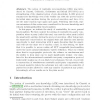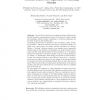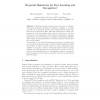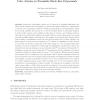139 search results - page 19 / 28 » Cryptographic Randomized Response Techniques |
EUROCRYPT
2009
Springer
14 years 10 months ago
2009
Springer
Abstract. The notion of resettable zero-knowledge (rZK) was introduced by Canetti, Goldreich, Goldwasser and Micali (FOCS'01) as a strengthening of the classical notion of zer...
PKC
1999
Springer
14 years 2 months ago
1999
Springer
One of the key directions in complexity theory which has also filtered through to cryptographic research, is the effort to classify related but seemingly distinct notions. Separa...
PKDD
2007
Springer
14 years 4 months ago
2007
Springer
Randomized Response techniques have been empirically investigated in privacy preserving association rule mining. However, previous research on privacy preserving market basket data...
ECCV
2008
Springer
14 years 11 months ago
2008
Springer
Abstract. Statistical learning techniques have been used to dramatically speed-up keypoint matching by training a classifier to recognize a specific set of keypoints. However, the ...
EUROCRYPT
2009
Springer
14 years 10 months ago
2009
Springer
Almost any cryptographic scheme can be described by tweakable polynomials over GF(2), which contain both secret variables (e.g., key bits) and public variables (e.g., plaintext bit...




